Submitted by WA Contents
Hair transplant clinic by Slash Architects combines technology and nature to create "digital forest"
Turkey Architecture News - Feb 10, 2023 - 14:41 5146 views
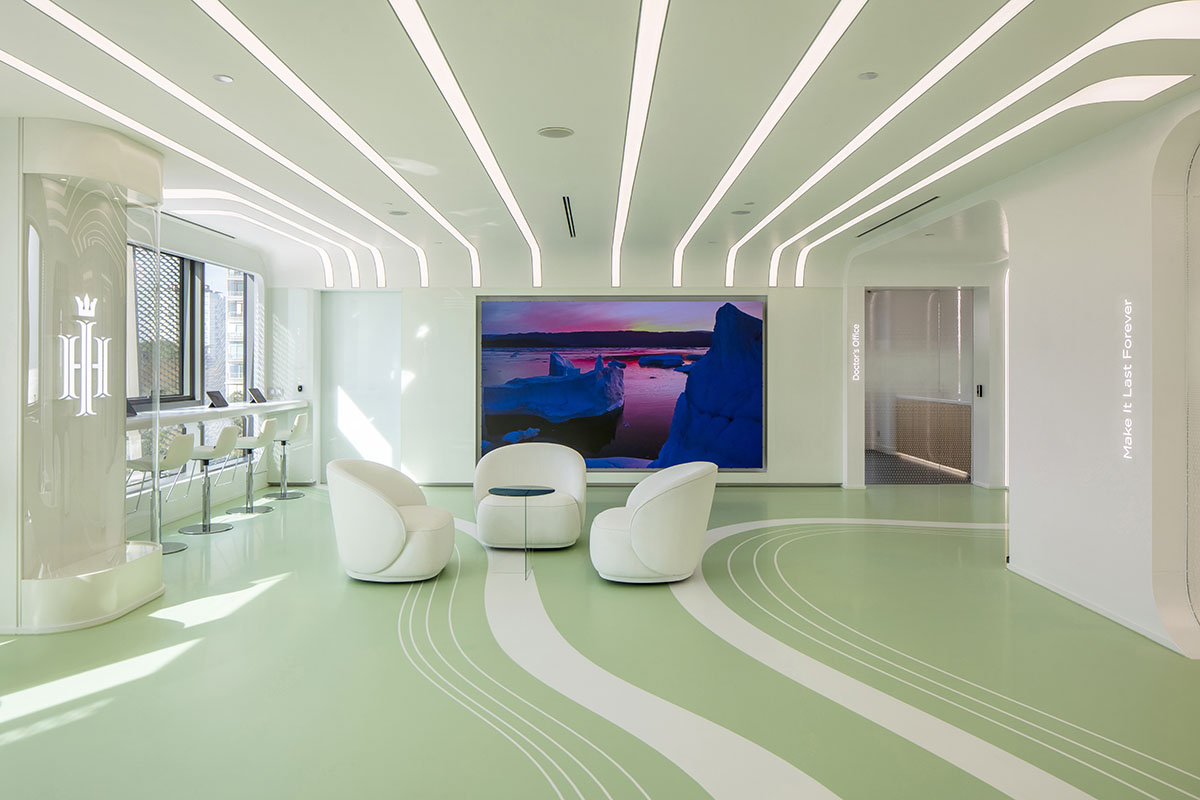
Istanbul-based architecture practice Slash Architects has designed a hair transplant clinic, combining technology and nature elements in fluid lines in Istanbul, Turkey.
The project, named Hair Transplant Clinic, is situated in the third floor of a residence building in Yalı Ataköy Complex by merging two flats in the same floor.
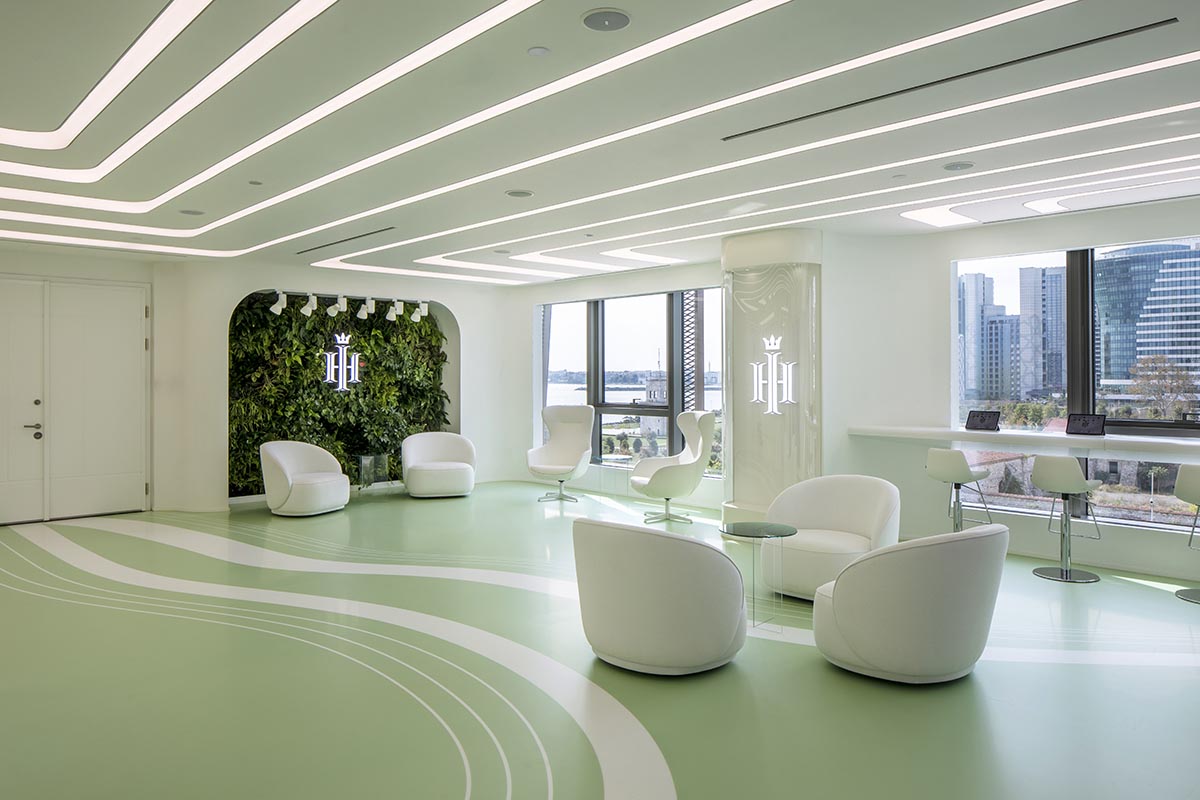
Covering a total of 450-square-metre area, the interior spaces of clinic are enriched with green-colored flooring, white curved lines and fluid-form barisol lightings on the ceiling together with a series of artworks.
Slash Architects, led by Şule Ertürk, aimed to create "a technological healing place", where both technological and natural elements are brought together to create a "digital forest".
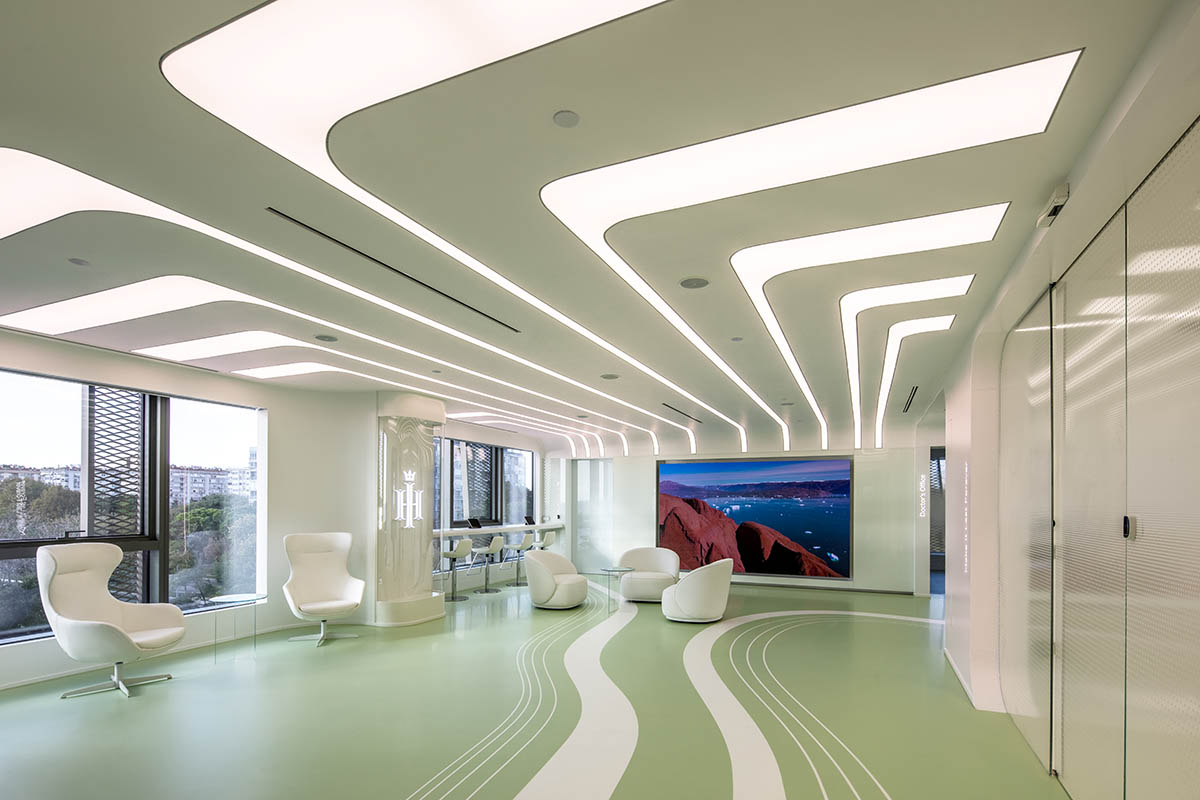
The overall program includes a lounge, hairline design capsule, two meeting rooms, doctor's office, five clinic rooms, cafe, hair wash room, sterilisation room, changing and technical rooms, kitchen and accounting office.
Program elements are connected via a corridor where green-colored capsules envelop the visitor while moving in the corridor.
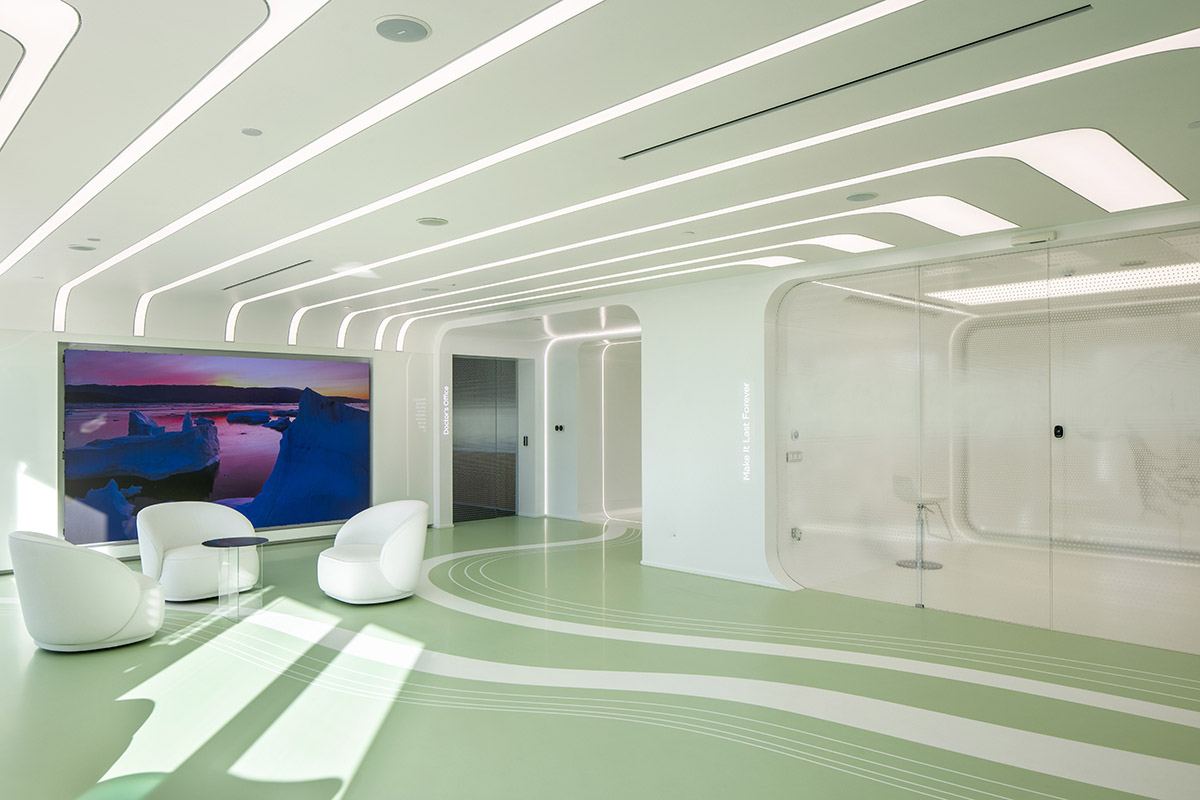
"These two seemingly conflicting themes are brought together to support each other in the design," said the studio.
"As a result of being a health center the feeling of a sterile environment is established with a minimalistic approach shaped around the concept of “flat design”, easy-to-clean surfaces, and the use of white color in different materials," the studio added.
Inside, the use of technology is highlighted with various elements such as sensor doors, mirror screens, video walls, and according to the architects, all these elements support the operation of a modern health facility.
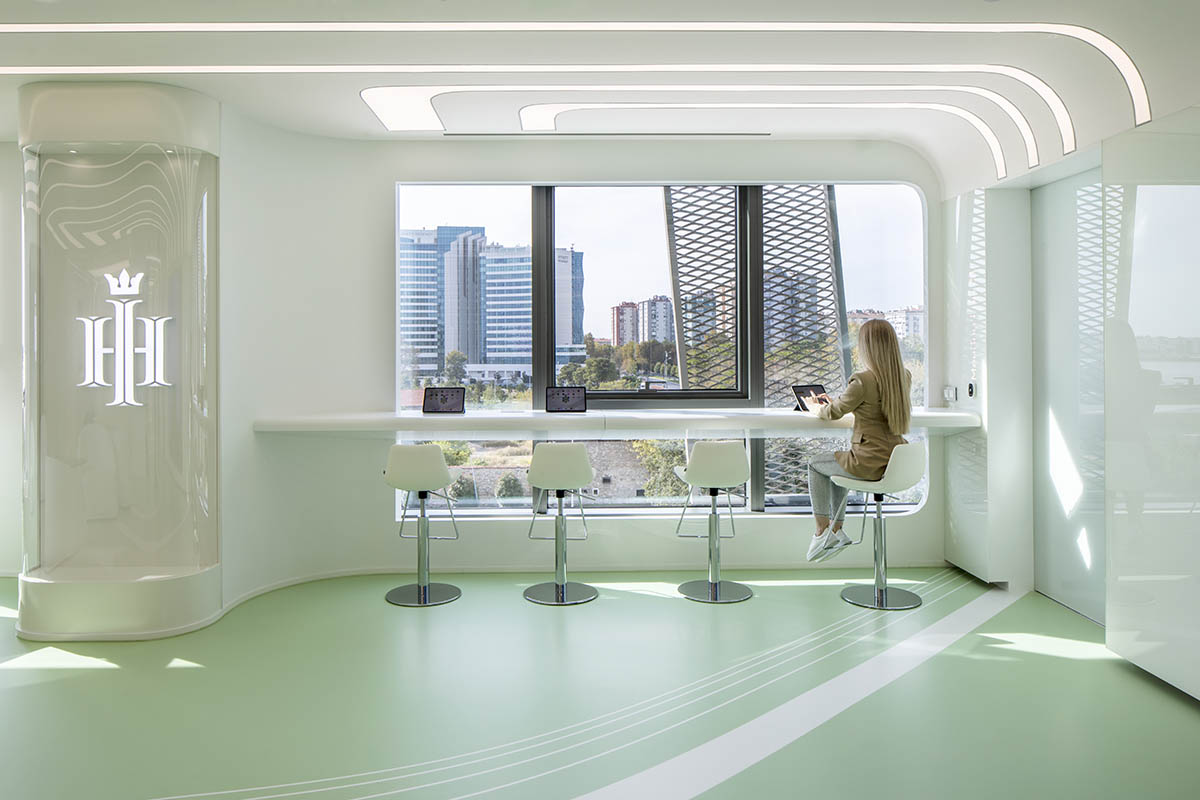
The architects use the term of "forest" to reference to the recovery and growth of a self-renewing ecosystem.
"This theme is included in the project in a way that allows visitors and staff to relax mentally in a hair transplant clinic which could be perceived as a space of self-healing," the studio continued.
The team integrated biophilic design principles into the project, aiming to include nature in the space visually, audibly and tactilely. The fluid geometric forms are inspired by nature, as the team explained.
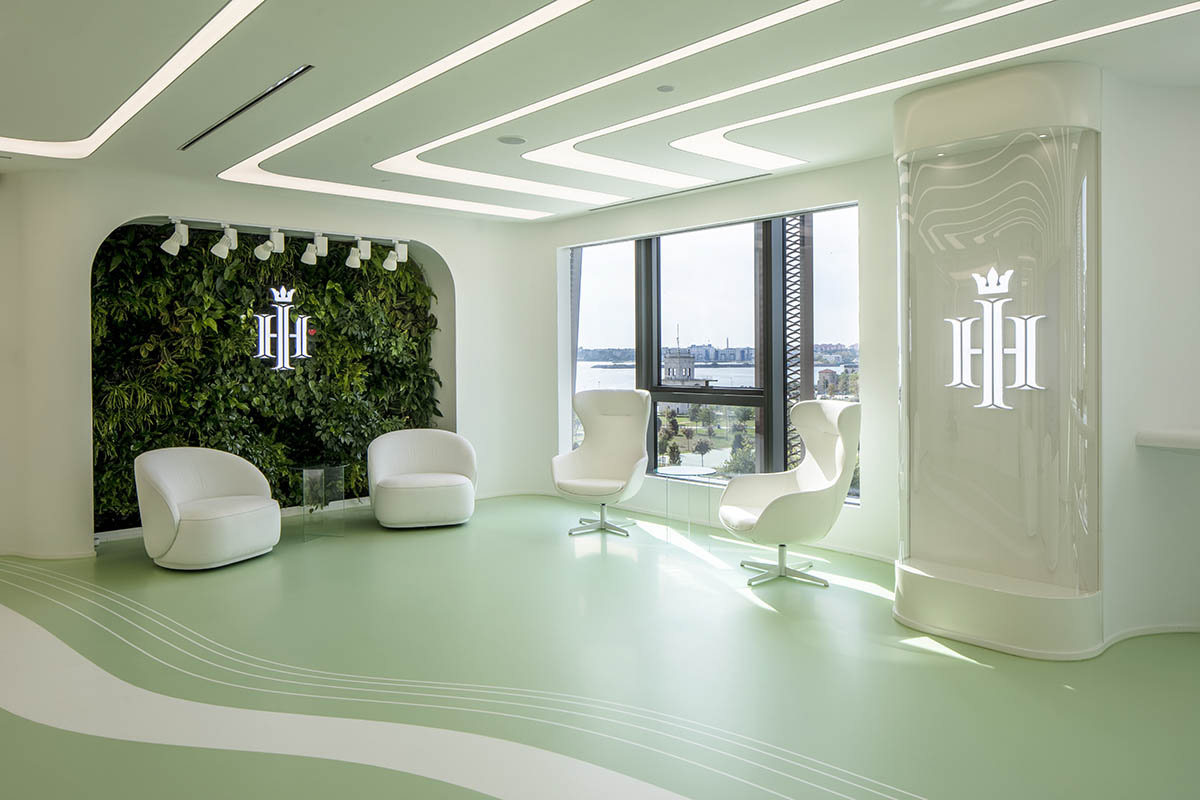
"The sterile feeling of the clinics, which is both reassures but also creates a cold environments is broken with the usage of vibrant green colours, natural materials and living green walls in main circulation areas and in the rooms users spend most of their time," the studio added.
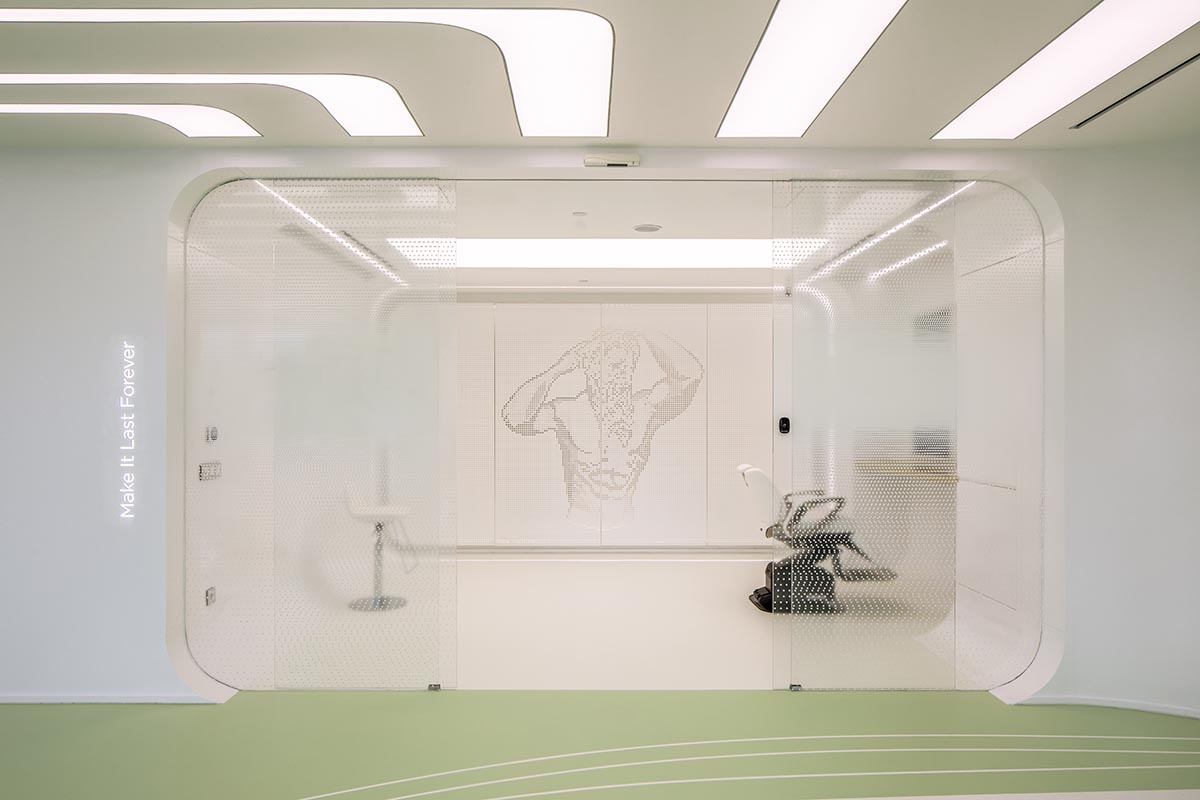
Artworks are scattered around the space
Other significant features that make up the third pillar of the concept are the artworks in the interiors.
For example, at the entrance a videowall at the entrance and a screen, positioned as an object of curiosity at the end of the corridor, are planned to display digital artworks.
The studio said that "In harmony with the concept of the clinic these artworks supported by soothing sounds will relax the visitors while they wait and wander around the clinic."
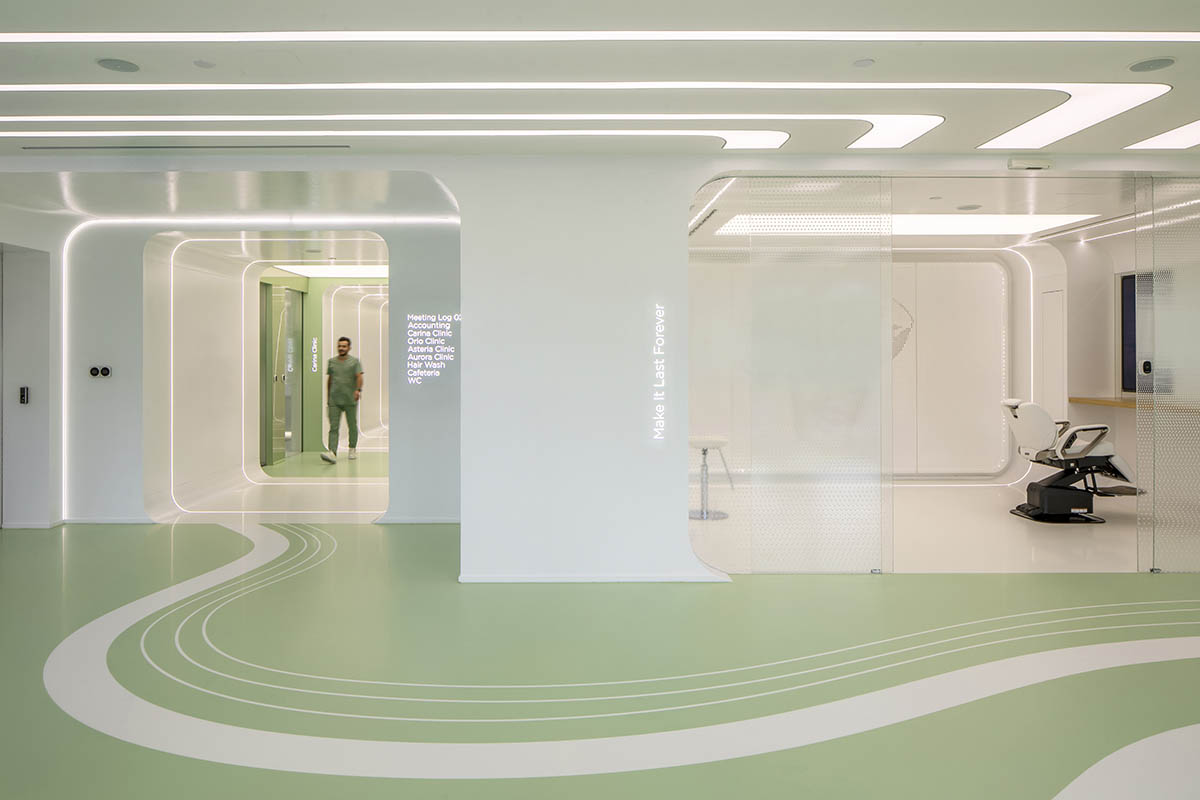
"In addition to this, two sculptures specially made for this project are presented at the beginning and the end of the corridor. All signage and graphic works are also considered together with the general concept."
While the main spaces are arranged in front of the façade, and the secondary service spaces are located close to the core. For this reason, the areas where employees and visitors spend more time receive daylight and natural ventilation is used when needed.
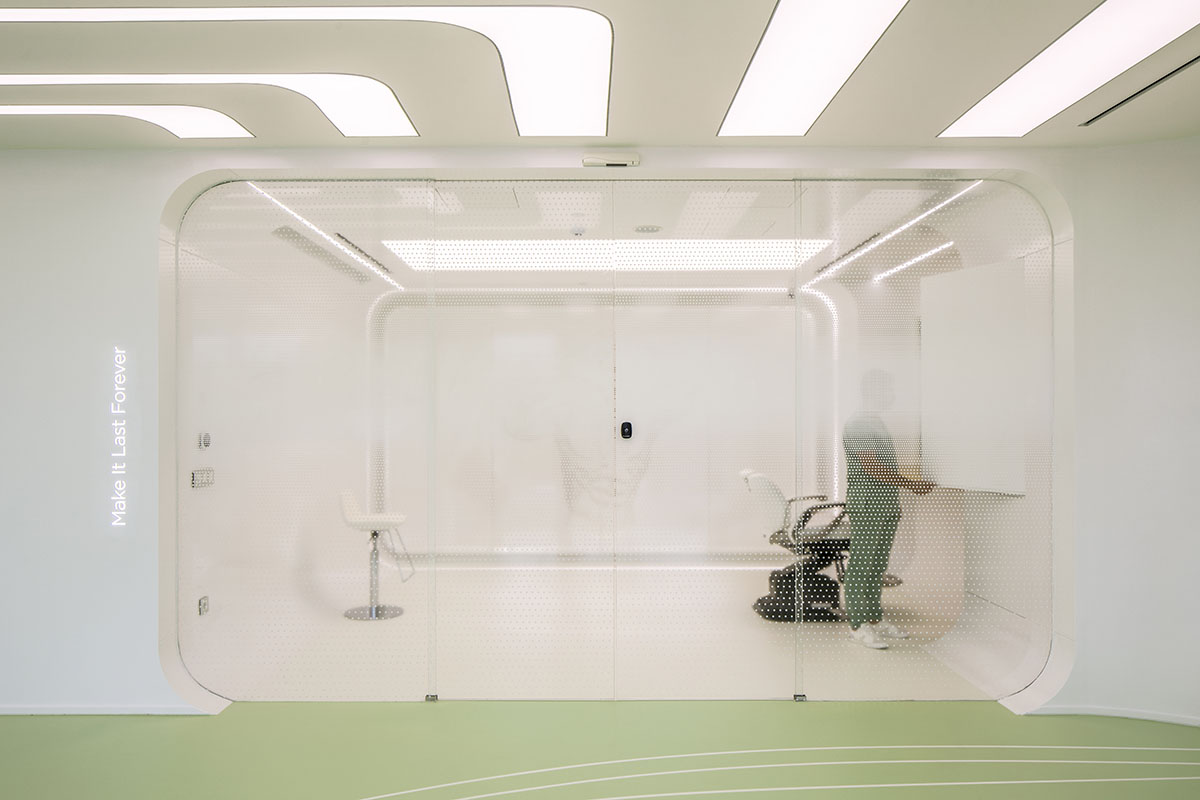
Since the clinic was designed by combining two flats, it has two entrances.
While the main entrance opens to a large waiting area, the secondary entrance serves as a service entrance. The technical volumes are located around it. The studio defined an uninterrupted and clear circulation route between these two entrances.
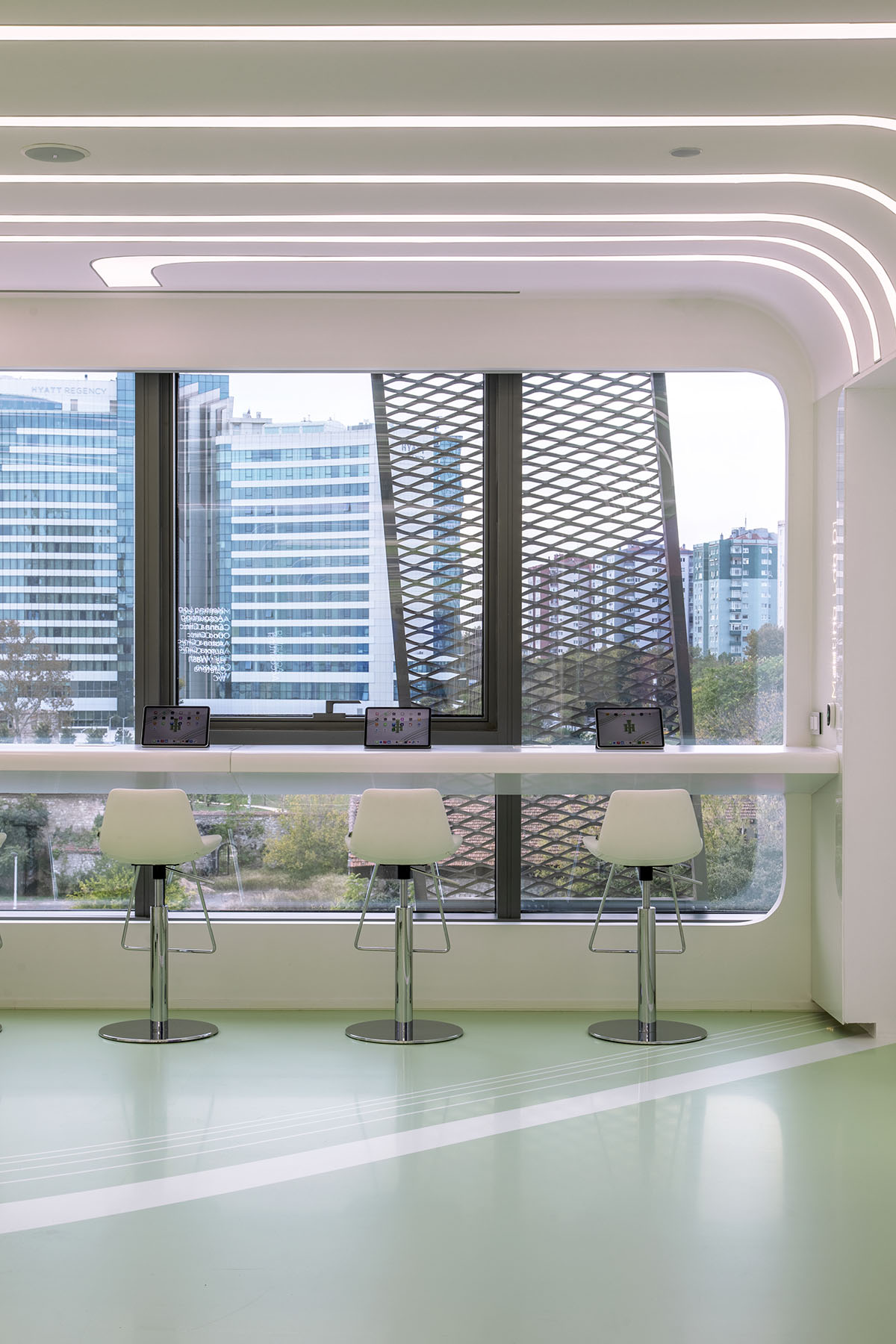
The architects turned the corridor, which is commonly designed as boring and monotonous, into an experience path with an object of curiosity at the end.
"Overall design approach infused with the technological feeling is also the main tool which is shaped the corridor form," the architects continued.
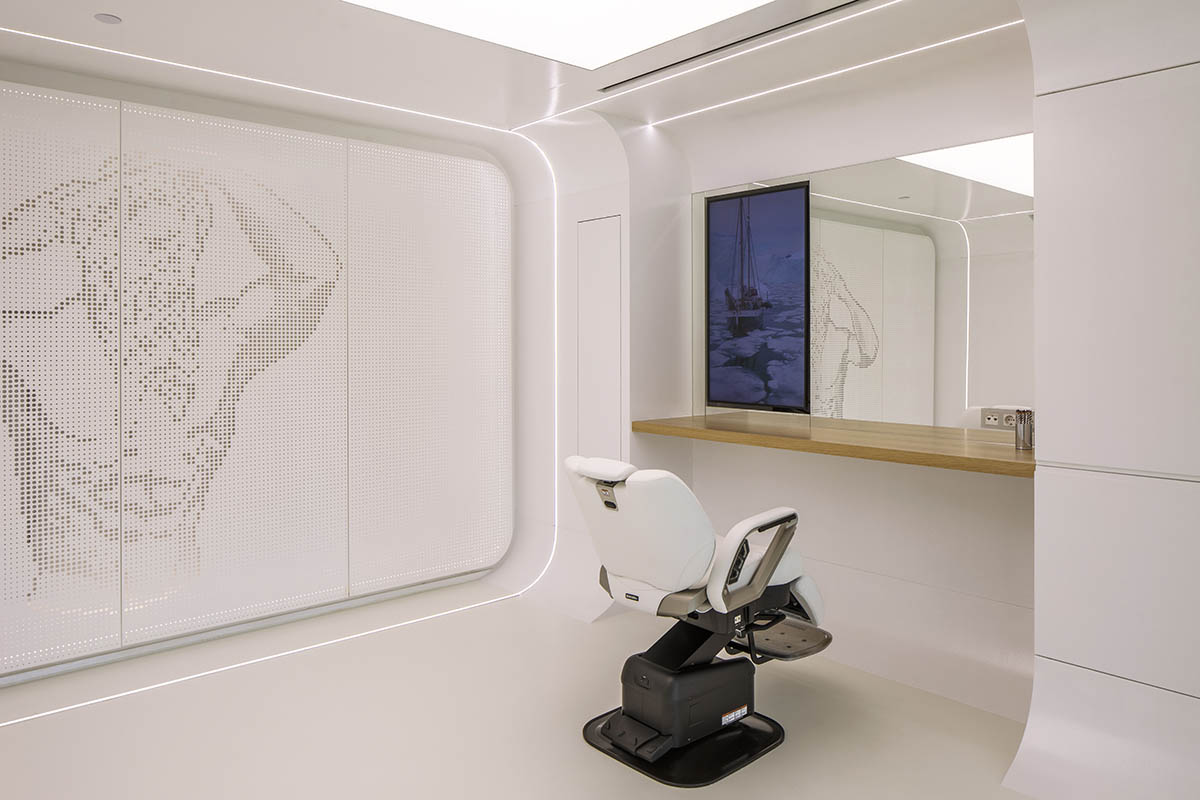
The floor, wall and ceiling of the corridor are seamlessly connected with curved surfaces and envelops the visitor like a capsule.
In order to emphasize the form, corridor lighting is provided with recessed linear lightings placed in the same section. This futuristic-feeling continious form is interrupted and pulled back in the niches where the entrance doors are located.
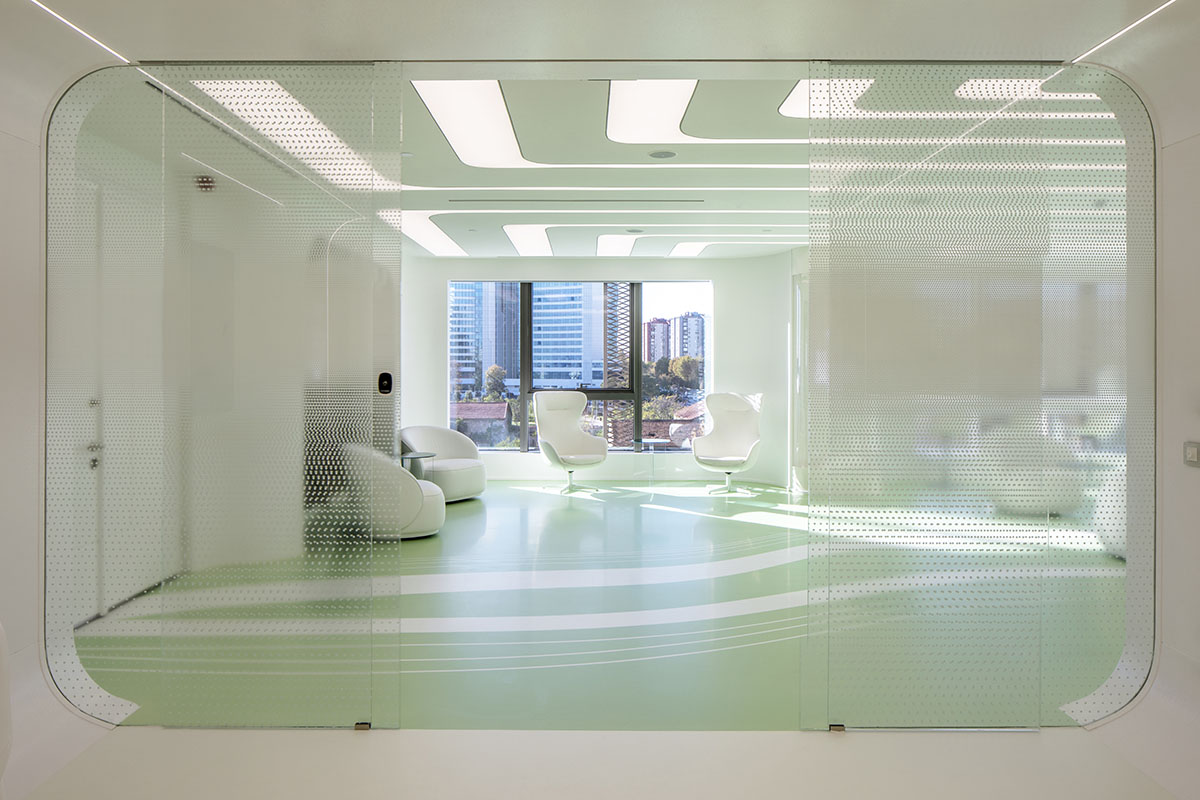
These niches are separated from the rest of the corridor with the barisol ceiling, green coloured floor and walls. Thus the entrances to the rooms become highlighted. Throughout this “journey”, the visitor is also accompanied by the visual and auditory stimuli of the digital artwork at the end of the corridor.
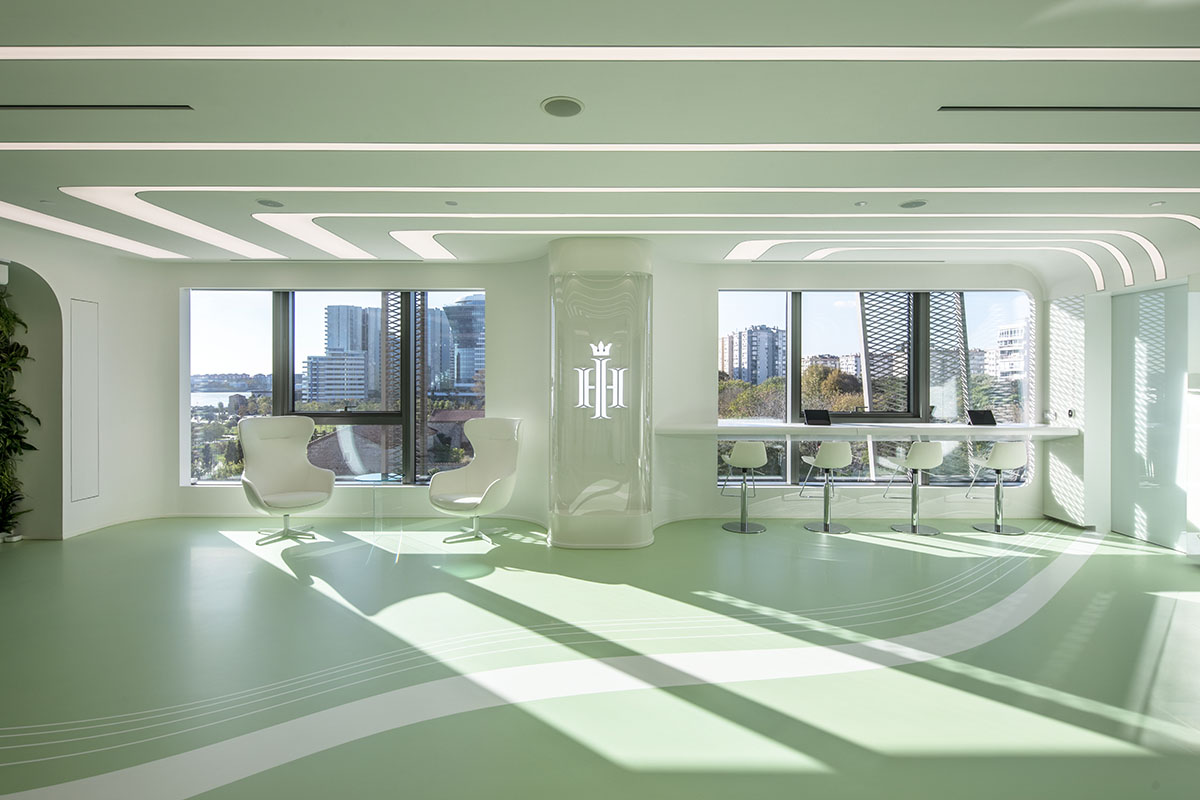
The entrance lobby is enriched with a digital screen facing the entrance, the fluid-form barisol lightings on the ceiling, the green living wall, the hot desk for working and comfortable resting areas.
A hair drawing area, which is considered as the "kitchen" of the hair transplant operation, is placed just to the right of the entrance. The drawing room has been made transparent and highlighted as a showcase space.
To ensure privacy, the studio implemented a semi-opaque film on the glass facade. This material also helps to reflect the impression of the movements inside.
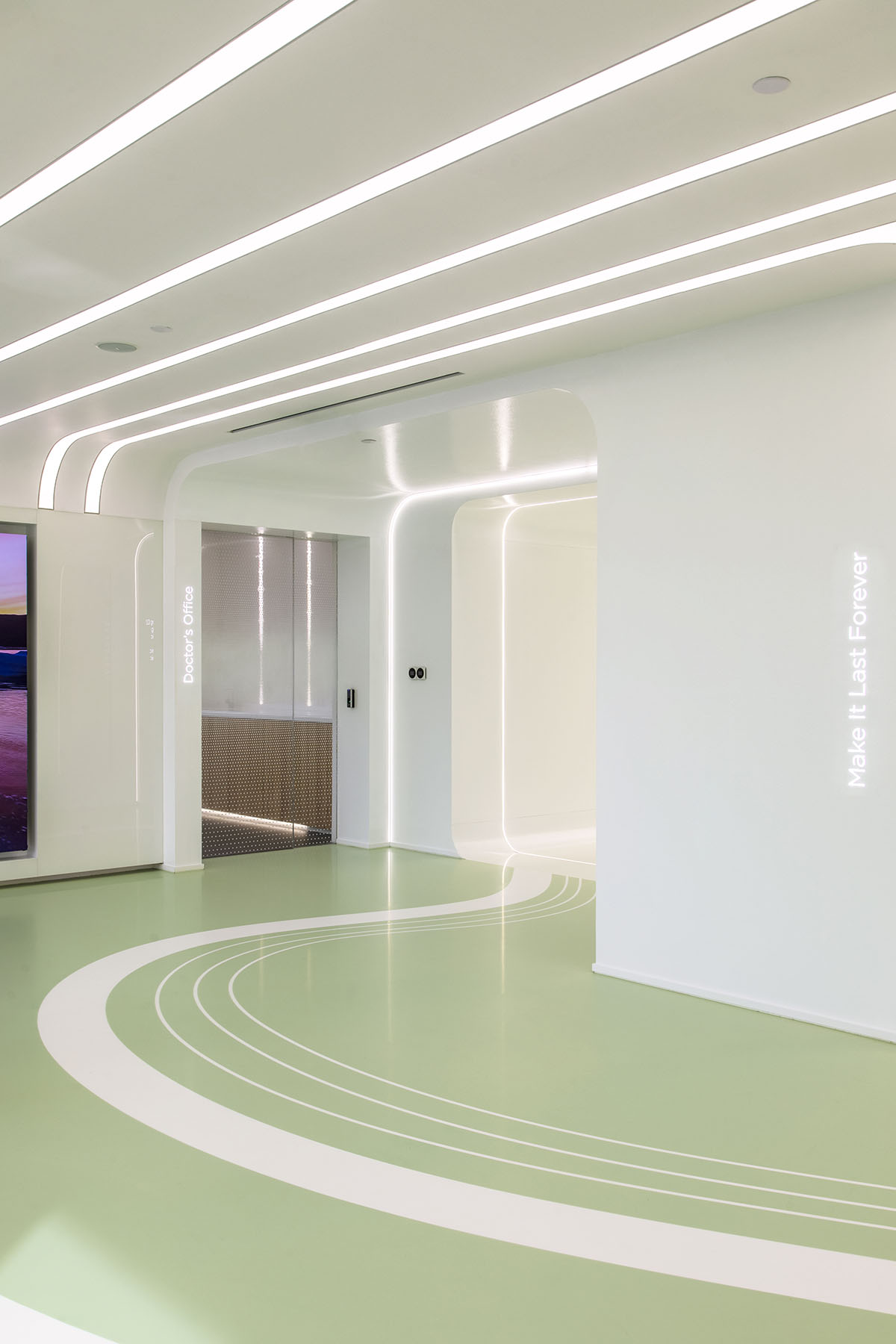
To include the brand identity in the project in a minimal way, the logo is transformed to a new graphic work and applied on the metal panels inside the drawing room.
In the entrance lobby, the living green wall creates a relaxing feeling for the visitors and comfortable armchairs, a hot-desk facing the sea view are placed in front of the facade.
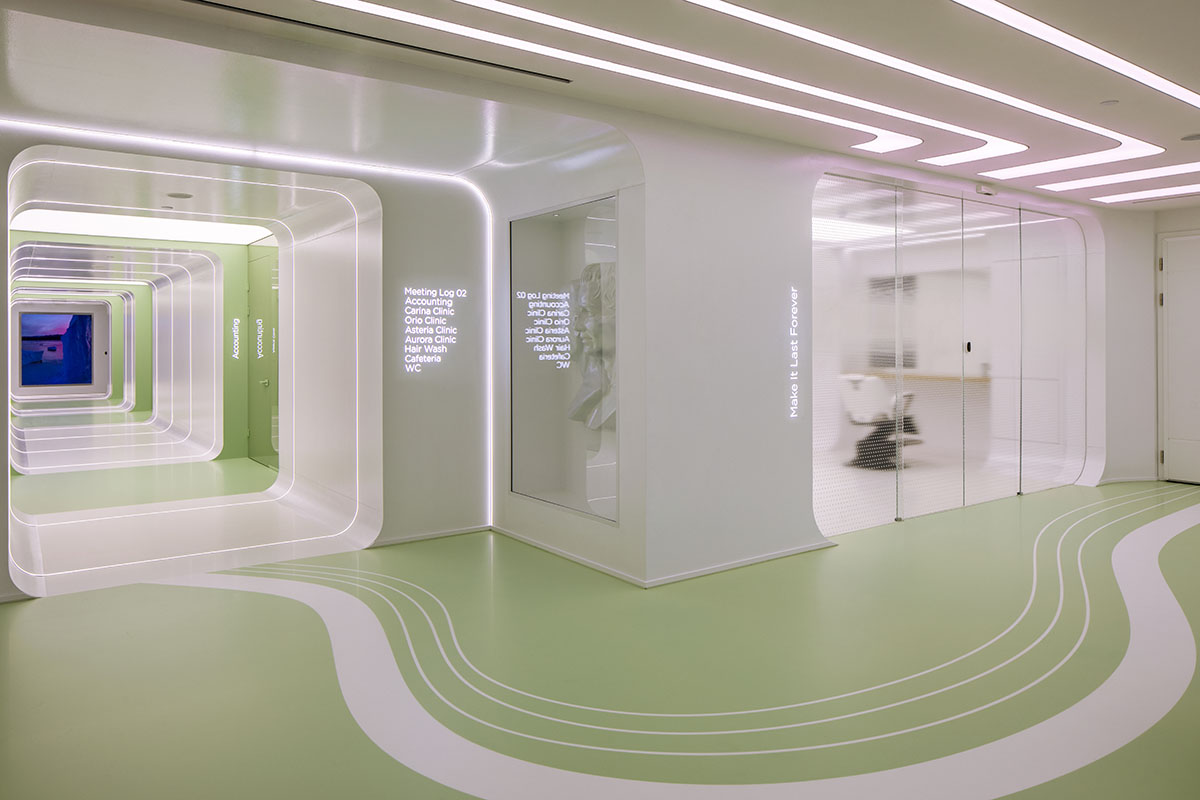
Considering the results of the pandemic, the lobby is divided into different zones for individual visitors waiting alone or family and groups avoiding to wait in a crowded space.
The studio designed clinic rooms in a minimalistic style. After the studio examined the mechanism of the hair transplant operation, it manufactured and added work benches with a cooled surface area into the space.
The cloakrooms reserved for the patients and the storage volumes containing the various products required for the operation are solved with hidden closets.
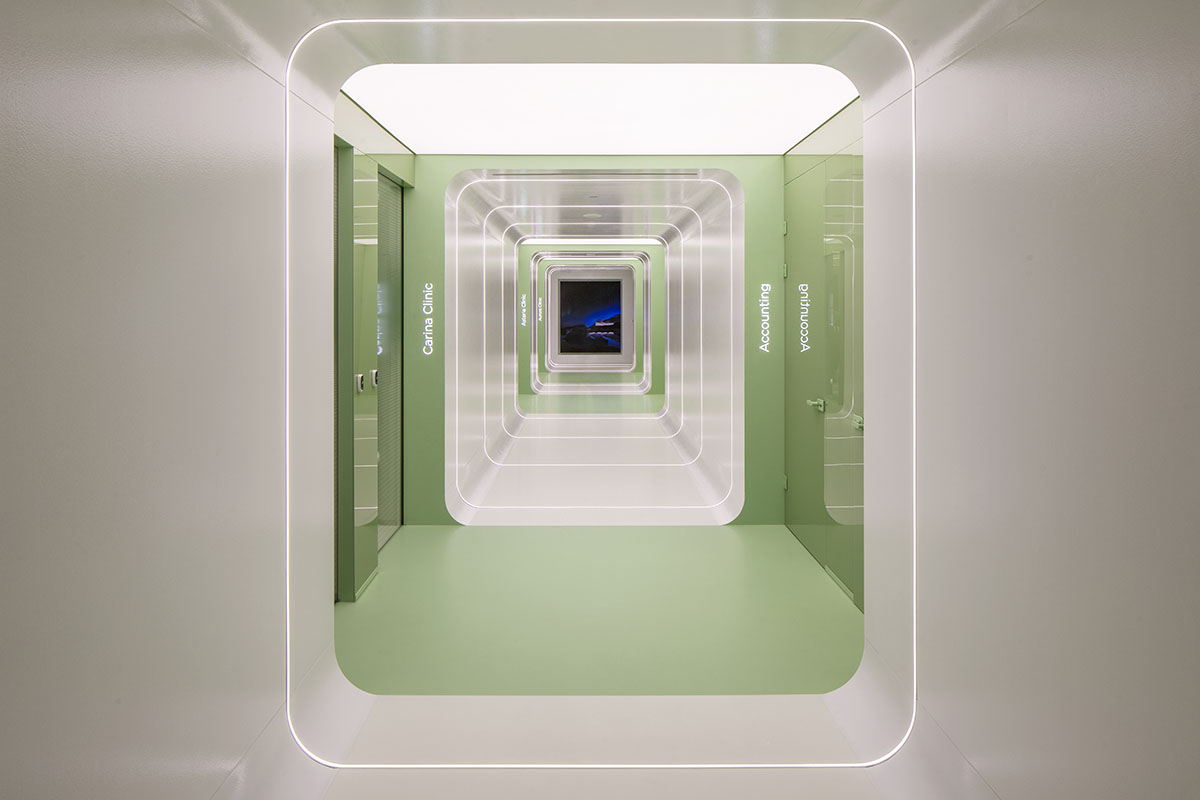
The cafe, an area dedicated to employees and visitors, is situated in front of the main facade to benefit from natural daylight and the view of green landscape.
In order to create a warmer and calmer environment, the studio used light green fabrics, natural wood materials and a living plant wall. To strengthen its relationship with the kitchen and to provide ease of service, the wall between the two rooms is designed with a counter and a service window.
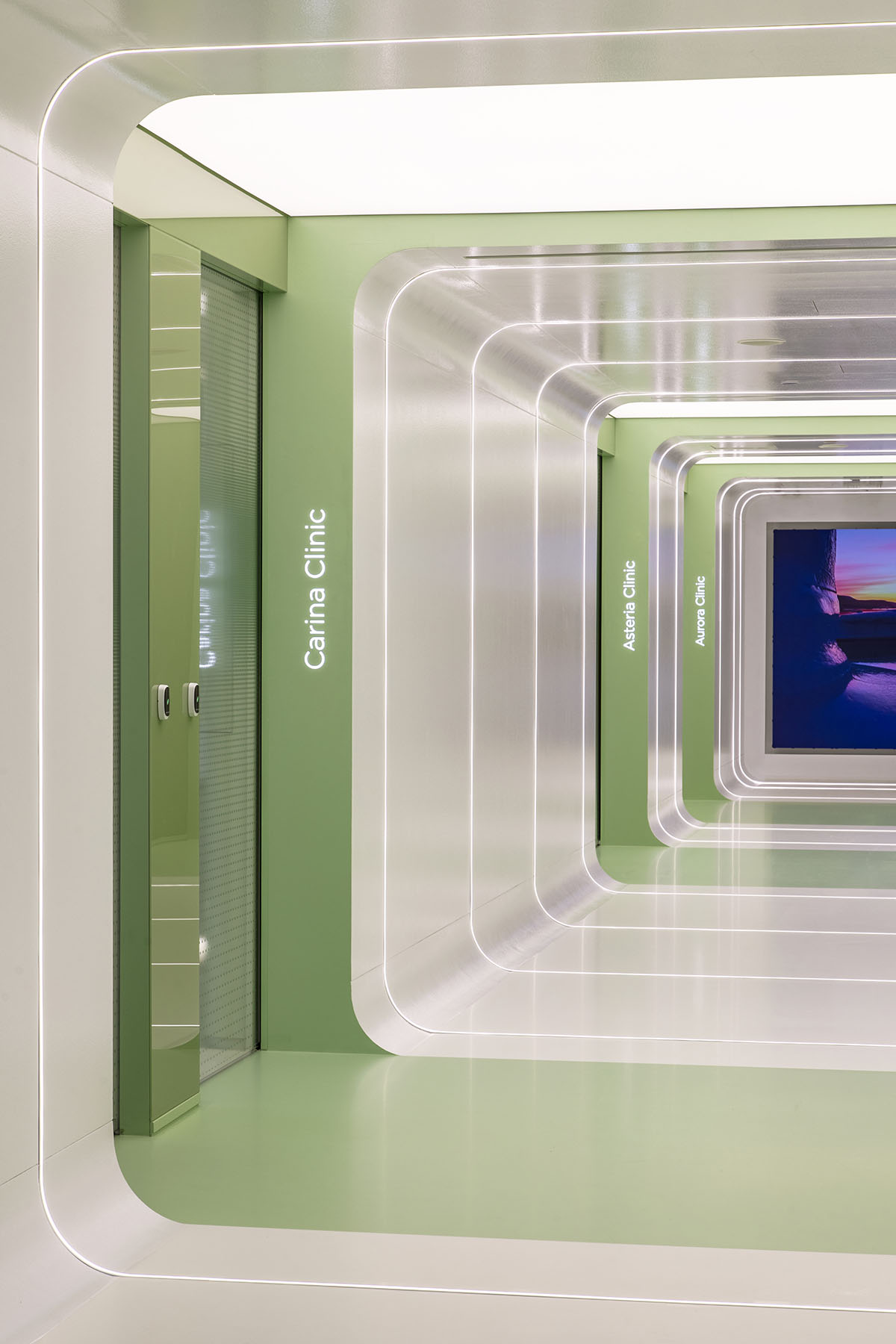
As a necessity of being a healthcare centre, the team selected to use long-lasting materials, resistant to strong chemicals, and surfaces that can easily be cleaned.
"All these design decisions are came together for the idea to create a new-age modern, digital, comfortable and inviting healthcare centre," the studio added.
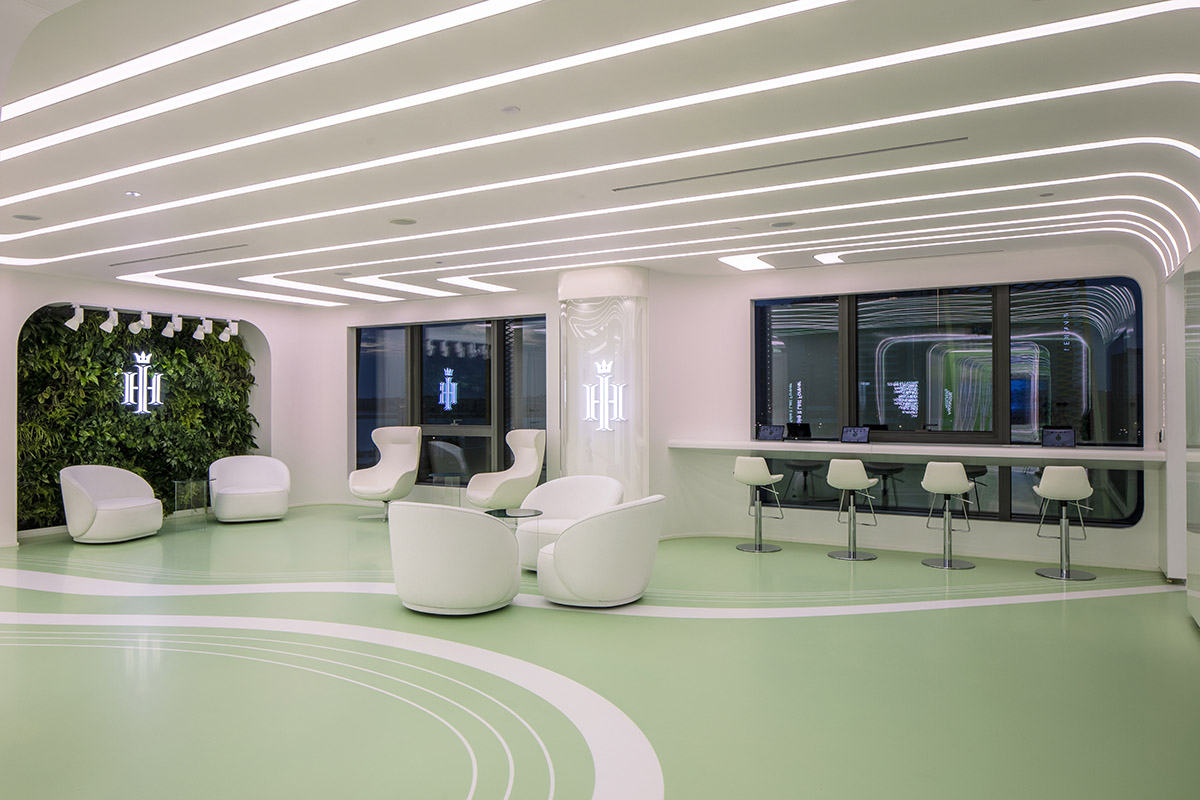
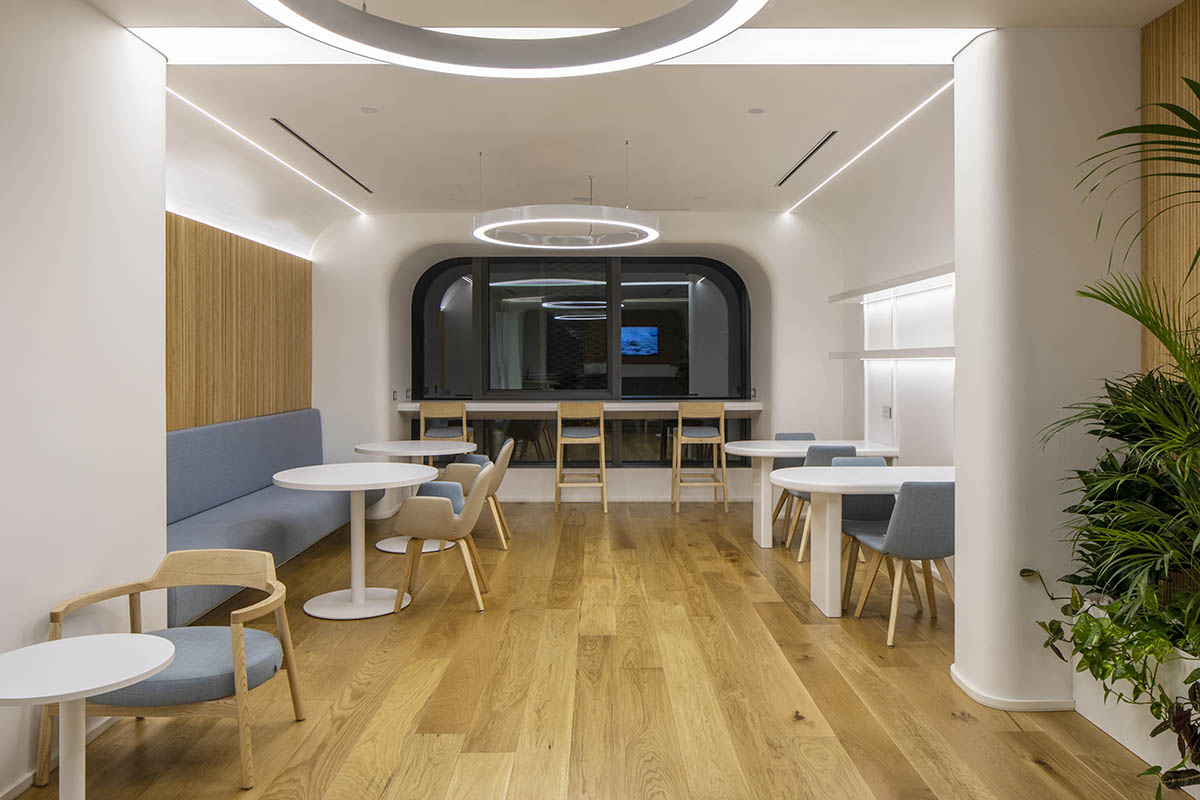
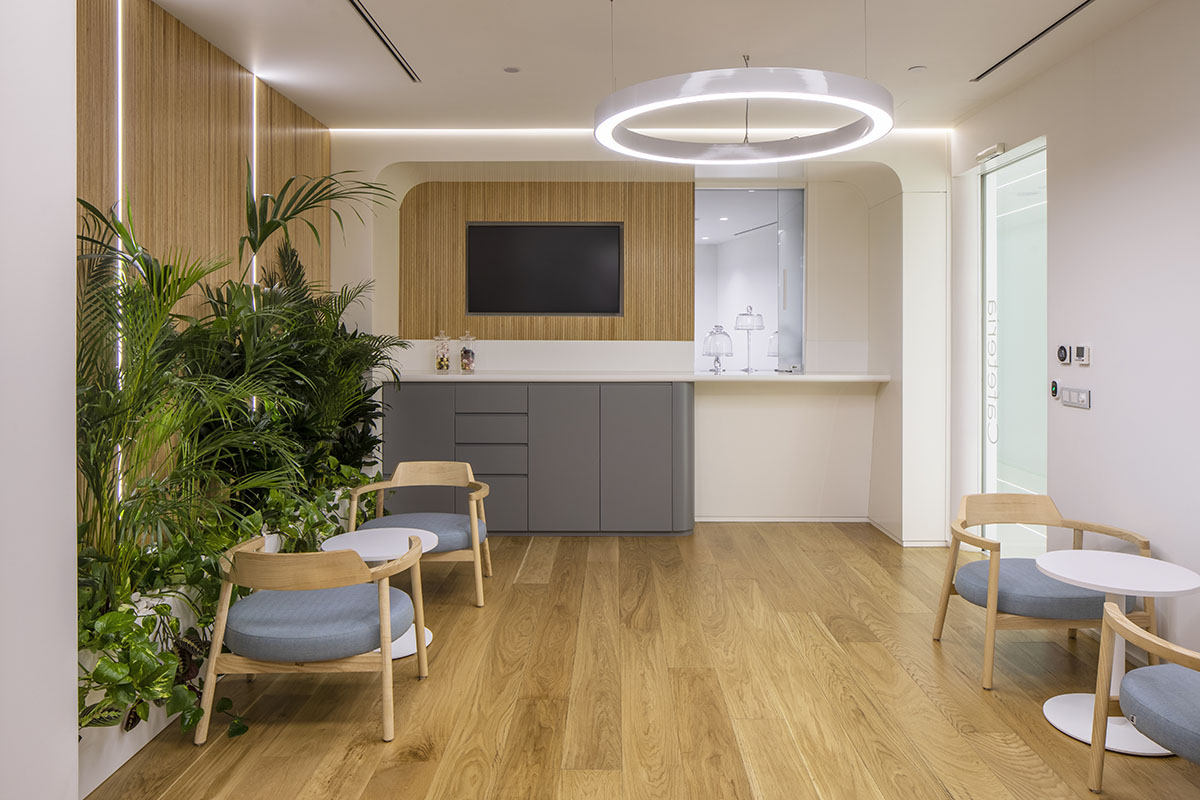
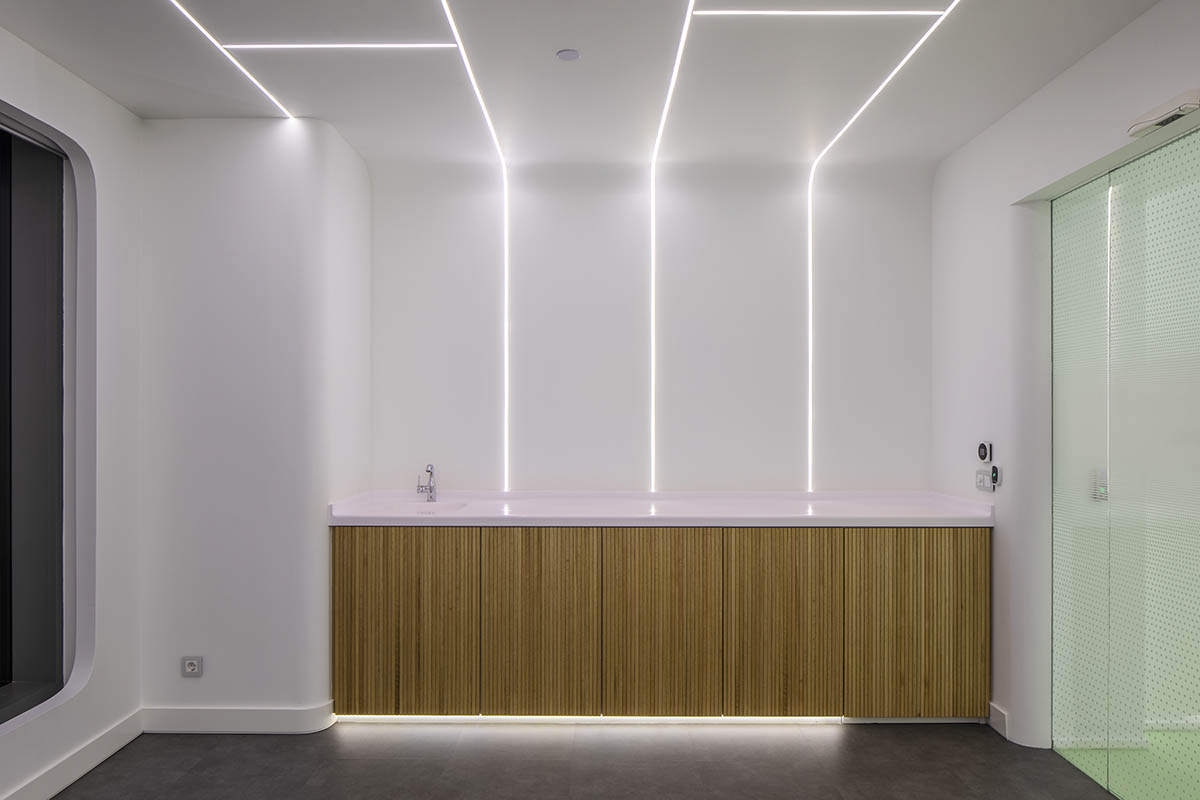
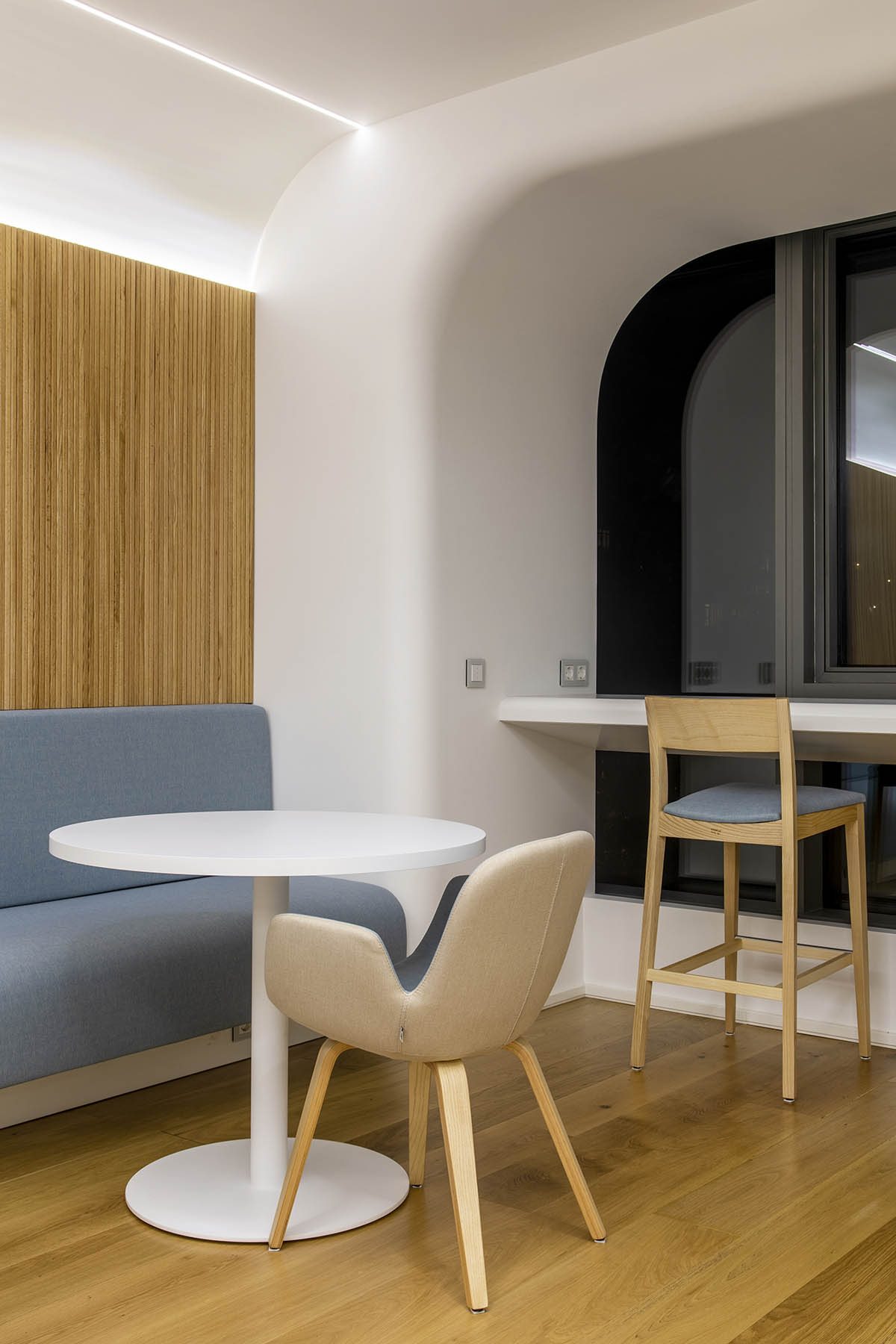
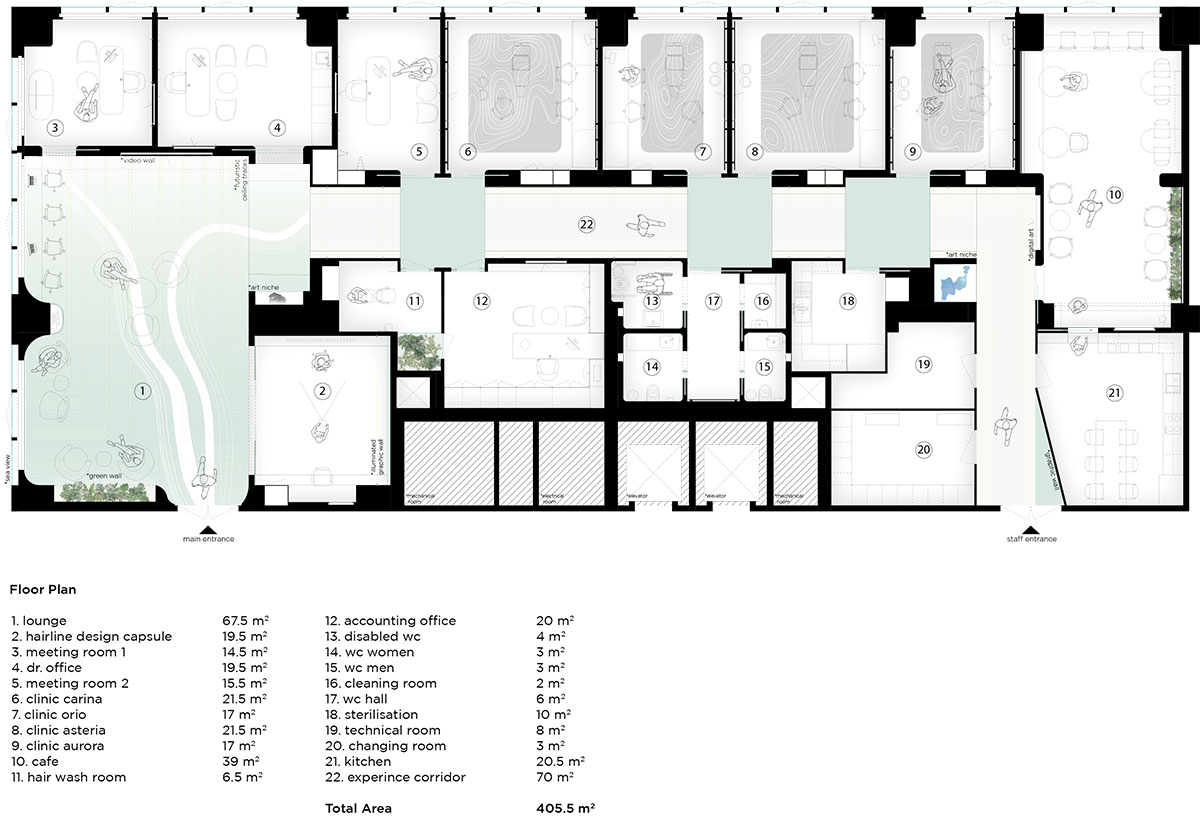
Floor plan

Corridor diagram
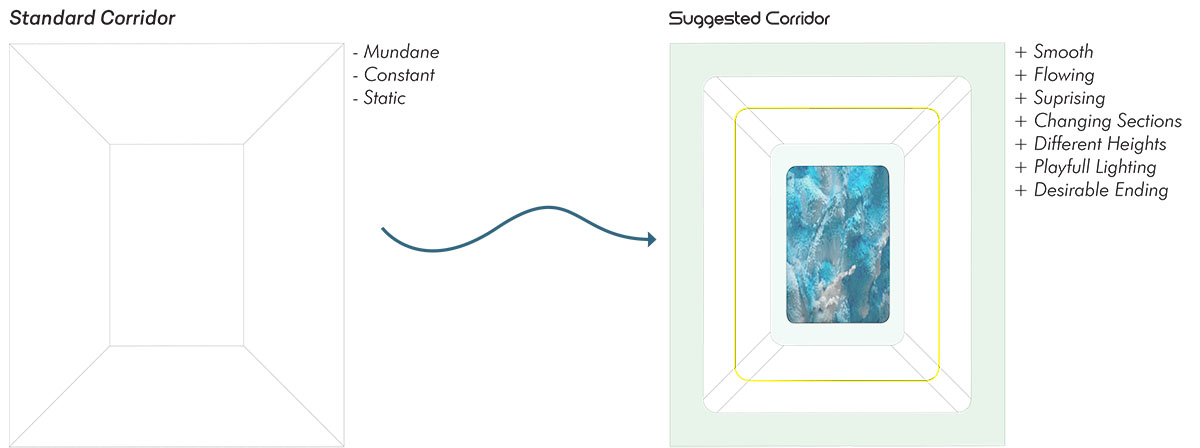
Corridor diagram
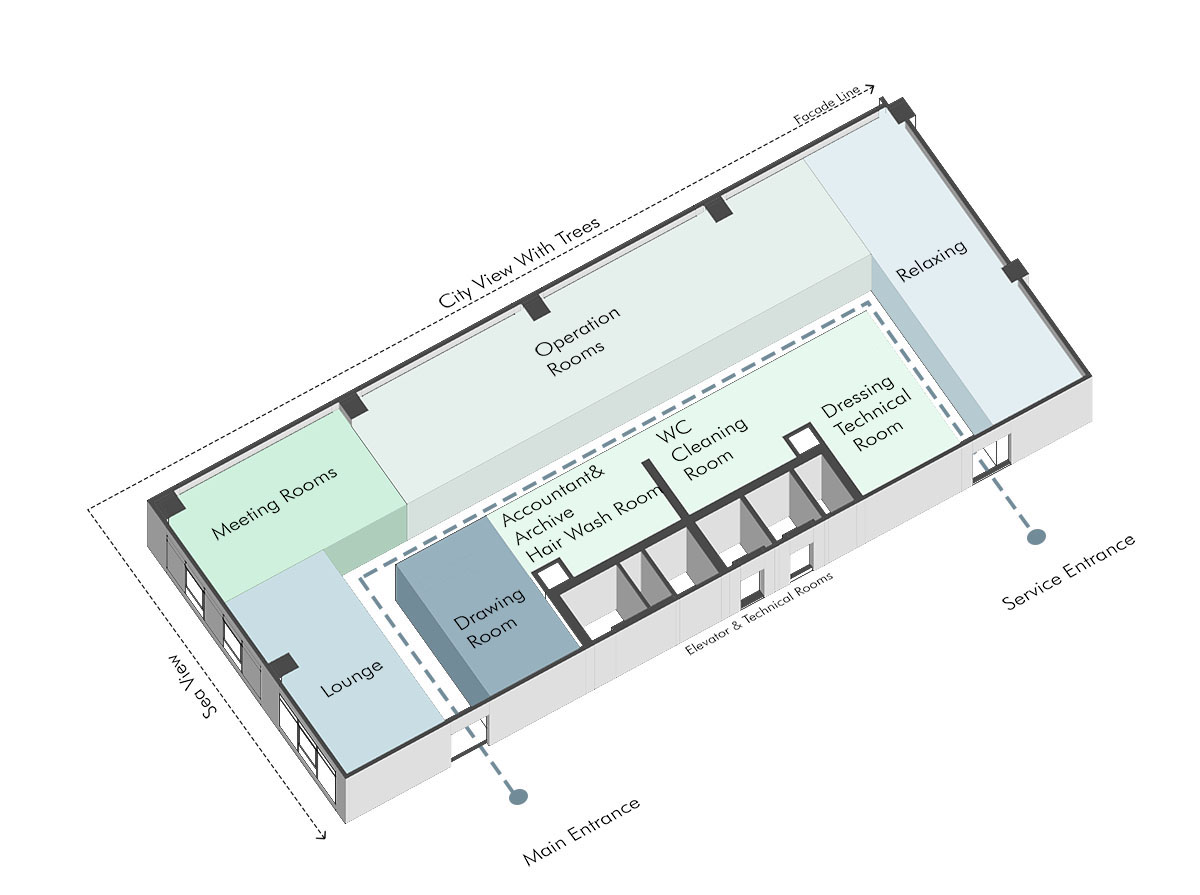
Zoning diagram
Slash Architects was founded by Şule Ertürk in 2013 in Istanbul. The office designs projects in the field of architecture, urban design, interior architecture and furniture design.
Project facts
Project name: Hair Transplant Clinic
Architects: Slash Architects
Location: Istanbul, Turkey
Project Year: Completed, 2022
Total Construction Area: 450 sqm
All images © Aks Construction Company.
All drawings © Slash Architects.
> via Slash Architects
